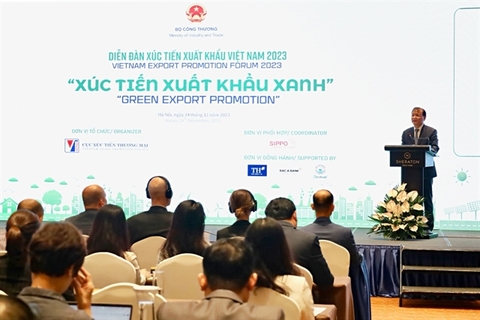
The Vietnam Export Promotion Forum 2023 with the theme of green export promotion was held in Hà Nội on November 24. — Photo congthuong.vn
Vietnamese businesses need to promote green transformation in production and export to develop sustainably and meet the global green consumption trend.
Deputy Minister of Industry and Trade Đỗ Thắng Hải was speaking at the Vietnam Export Promotion Forum 2023 with the theme of green export promotion held in Hà Nội on November 24, by the Department of Trade Promotion (Ministry of Industry and Trade) with the coordination of Swiss Import Promotion Programme.
The forum aims to discuss practical solutions for green development and green export and supportive solutions for businesses to meet the requirements of import markets.
In his opening speech, Hải said that the issues of green development and green export were no longer new topics. Green growth, green development and circular economy have become global trends because they are positive solutions to reduce greenhouse emissions, and improve the resilience of the economy, towards the goal of carbon neutrality and sustainable development.
According to the Deputy Minister, green and sustainable development is one of the important tasks in Việt Nam's 10-year socio-economic development strategy 2021-2030; the Goods Import and Export Strategy to 2030; and the National Strategy on Green Growth for 2021-2030 period, vision to 2050.
Meanwhile, many developed countries in the world have set stricter environmental regulations for imported goods, such as the EU Carbon Border Adjustment Mechanism (CBAM); Farm to Fork Strategy; EU's Circular Economy Action Plan, and EU Biodiversity Strategy for 2030.
According to the Deputy Minister, in order not to be eliminated from the game due to the high environmental and social standards set by the import markets, exporting countries, such as Việt Nam, need to pay attention to the "green" supply chain in international trade activities to meet the strict technical requirements of the import market.
Deputy Minister Hải emphasised that in order to reach the goals, from 2022, the Ministry of Industry and Trade had oriented and supported local businesses in converting growth models towards reducing carbon emissions. The ministry had also promulgated policies and mechanisms to support the enterprises in carrying out solutions on applying green technology and improving energy use efficiency.
The Government had approved the National Electricity Development Plan for the period 2021-2030, vision to 2050, with the goal of promoting the development of renewable energy sources and sharply reducing coal power.
In addition, the Ministry of Industry and Trade had regularly worked with Vietnamese trade agencies abroad, organisations and commodity associations to exchange information and update the latest information on international regulations and legal policies of importing countries, especially regulations on the reduction of greenhouse gas emissions, and policies and standards on green products.
This helped local businesses improve awareness and capacity in the process of production and business, meeting the regulations of importing countries.
Director of Trade Promotion Agency Vũ Bá Phú said the local enterprises needed to focus on developing green exports because products that meet green standards and carbon certification would have higher selling prices than the normal export products.
Second, green exports would improve competitiveness as green export products would not have to be paid carbon tax, while similar products from other countries that had not yet met green standards would have to pay carbon tax. This would be an opportunity for local enterprises to improve competitiveness if they achieve green standards.
Besides that, Việt Nam was preparing to issue indicators about green transformation in trade promotion and export promotion. That was an action to perfect the legal document in the development of green export.
Clement Graf, head of Sippo Programme said his first recommendation would be proactive in the process of green transformation. Việt Nam's enterprises should get in touch with their clients in Europe to have requirements relating to green exports in the future. This would help Việt Nam's enterprises to prepare for what the clients need from them.
At the forum, Đinh Quốc Thái, Vice Chairman and General Secretary of the Vietnam Steel Association, said that the steel industry - one of the industries that use a lot of energy and create emissions, was forced to speed up the process of green transformation and reduce emissions to increase exports to the EU, and to achieve net zero in the long term.
However, it was not easy for the industry's businesses to fulfil this requirement because making green steel is a long road. That would need financial and technological resources, as well as the initiative of businesses, especially when regulations are reduced. Carbon emissions were still new.
According to Thái, Việt Nam's steel businesses will continue to coordinate with relevant units to take action to meet the EU's Carbon Border Adjustment Mechanism (CBAM).
The association will continue to research solutions to reduce carbon emissions, ensuring progress towards a competitive and green steel production industry. To boost exports, domestic steel businesses must improve their knowledge of green and sustainable production.
In addition, management agencies need to simplify procedures for reports on data relating to CO2 emissions. — VNS